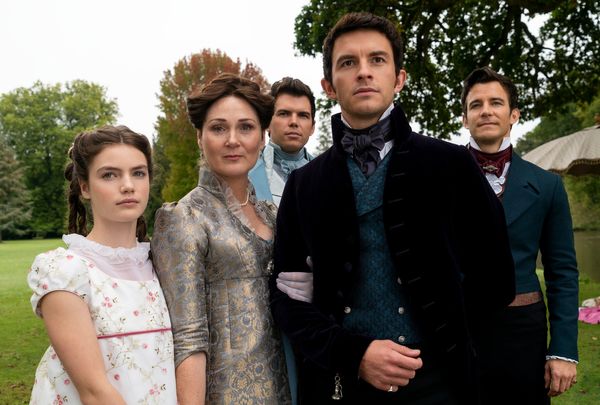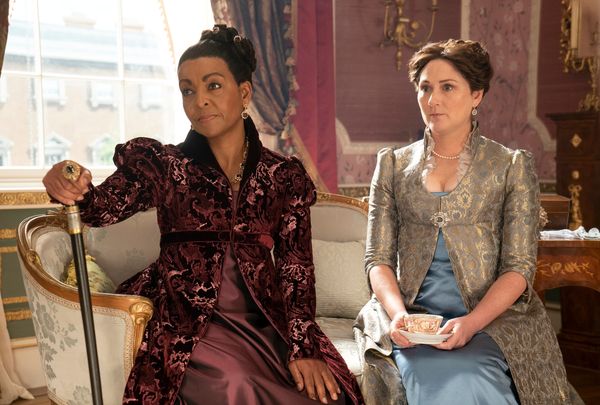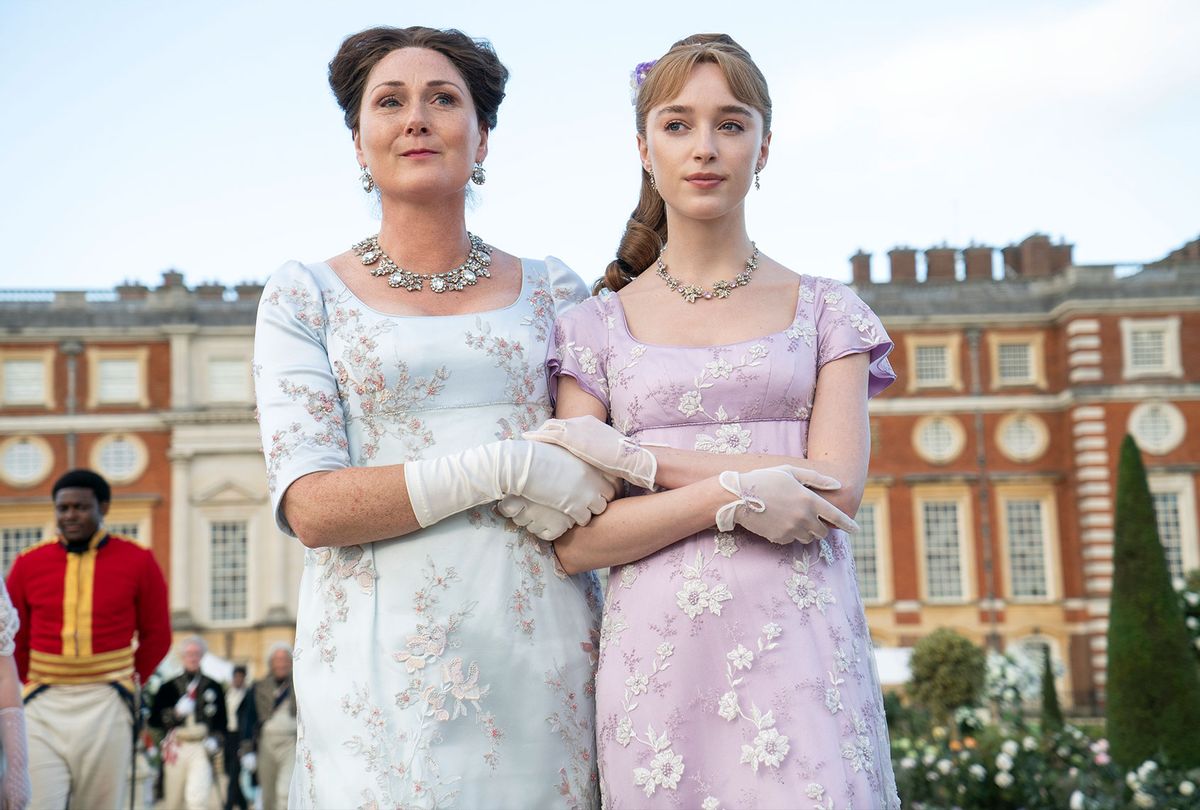Lady Whistledown, the high society gossip writer, may narrate episodes of "Bridgerton," Netflix's Regency drama from Shondaland, currently in its second season. Unmasked as Penelope Featherington last season, the young writer dashing in and out of carriages, hiding in a maid's cloak and adopting fake accents at the print shop is played by Nicola Coughlan with Julie Andrews providing the voiceover narration.
But Whistledown is not the one pulling the strings, only describing them.
Despite increasing diverse casting with the characters, the world of "Bridgerton" is still a patriarchal one where men are in charge, and (heterosexual) marriage means everything.
For women, it's the only thing, the only way to improve one's life circumstances and hope to get by — which makes the fall of the Featheringtons after the death of their patriarch all the more desperate; the women in the family go from depending on one man to another.
In this world, however, we have multiple examples of strong women who do everything they can to make change: especially the Queen (Golda Rosheuvel), Lady Danbury (Adjoa Andoh) and Lady Bridgerton. The Queen has the most obvious pull of the bunch, though she mostly uses it to throw fêtes and meddle in marriages. And one of the women, Lady Bridgerton, seems to have powers of her own, bordering on prophetic.
Related: Dearest "Bridgerton" viewer, loosen your corset because this season smolders to the very end
"Bridgerton" centers on the Bridgerton family, who have a lot of money and a heck of a lot of kids. The first season belonged to eldest daughter Daphne (Phoebe Dynevor) and her eventual and inevitable marriage with Simon (breakout Regé-Jean Page), a handsome and aloof Mr. Darcy-esque Duke. The Mr. Darcy of this season is the Bridgerton's eldest son, Anthony (Jonathan Bailey), who protested and stymied his sister's marriage prospects in the name of protecting her. Regency romances really love their Mr. Darcys. And behind every Darcy is a Lady Anne.
The Lady here is Lady Violet Bridgerton (Ruth Gemmell). In the first season, the Bridgerton matriarch mostly supported her eight (yes, eight) kids. She attempted badly and too late to talk to Daphne about sex — on her daughter's wedding night. The sheltered way Lady Bridgerton was raised did not serve her daughter. She faltered, flustered, her face turning red. Her attempts were fruitless, to connect with her daughter, to help her.
 Florence Emilia Hunt, Ruth Gemmell, Luke Newton, Jonathan Bailey, and Luke Thompson play Lady Bridgerton with half of her brood in "Bridgerton" (Liam Daniel/Netflix)Lady Bridgerton is really nice. This can mean she's overlooked, dismissed. And, as with Daphne's sex talk, she sometimes does the wrong thing, clumsily.
Florence Emilia Hunt, Ruth Gemmell, Luke Newton, Jonathan Bailey, and Luke Thompson play Lady Bridgerton with half of her brood in "Bridgerton" (Liam Daniel/Netflix)Lady Bridgerton is really nice. This can mean she's overlooked, dismissed. And, as with Daphne's sex talk, she sometimes does the wrong thing, clumsily.
But she continually and quietly does the best she can, despite her limited ability to help and her limited position in the "ton." As a widow, her main responsibility is to ensure her children get out of the nest safely — even though Anthony's future wife will, in effect, replace her as the female head of the household.
In the second season, we learn more about how Lady Bridgerton was widowed young, and are given a hint of the real love Lady and Lord Edmund Bridgerton shared, before it was cut short. Lady Bridgerton was very pregnant at the time of her husband's sudden and violent death. That scene of childbirth and after are difficult emotionally, both for the raw grief on Gemmell s face as well as the precarious condition of a woman's life at this time, in a body that doesn't really belong to her, not as far as decisions go (sound familiar?). A young Anthony is put in the impossible position of choosing between his mother and his infant sibling: A doctor makes him decide for her, should the difficult birth come to that.
The likely postpartum depression that Lady Bridgerton is plunged into after giving birth to her deceased husband's last child, who will never know him, feels very real. It's also a chance for Gemmell's subtle, emotional performance to go dark, go deep. The word that seems most fitting for Gemmell is vulnerable. She risks a lot, including that the audience may turn away from her during the next stage of Lady Bridgerton's grief, which is anger. But all she can do is feel.
Lady Bridgerton and women like her don't have a lot of power. But that doesn't mean they don't have pull. She serves as her children's advisor. Even if they don't listen to her, at least at first, that doesn't mean she's not right. She advises Anthony to start thinking about his own marriage — rather than meddling in his sister's — early in the first season.
He won't, for a while. "You will end up alone with such expectations," she warns, the Cassandra for the "ton."
She's a good dispenser of advice, though (also like Cassandra) much of it is ignored. "We must be willing to look to find the partner that will excite us," she offers, along with, "Marry the man who feels like your dearest friend." Maybe Lady Bridgerton could run her own advice column, alongside Whistledown?
Whistledown is the voice of the show — but Bridgerton is the voice of reason.
 Adjoa Andoh and Ruth Gemmell in "Bridgerton" (Liam Daniel/Netflix)And Gemmell does more with a glance than other actors with many more lines. Shock, disappointment and pain wash over her features. Multiple scenes end with a look from Lady Bridgerton. It's a knowing look. She pinpoints the true couple of season two — as she did with season one — with Rose Weissman-level matchmaking skills, even if she doesn't speak up about it. She knows. And viewers know from her face.
Adjoa Andoh and Ruth Gemmell in "Bridgerton" (Liam Daniel/Netflix)And Gemmell does more with a glance than other actors with many more lines. Shock, disappointment and pain wash over her features. Multiple scenes end with a look from Lady Bridgerton. It's a knowing look. She pinpoints the true couple of season two — as she did with season one — with Rose Weissman-level matchmaking skills, even if she doesn't speak up about it. She knows. And viewers know from her face.
Want a daily wrap-up of all the news and commentary Salon has to offer? Subscribe to our morning newsletter, Crash Course.
Lady Bridgerton seems almost otherworldly in a world where women continually prance about in ethereal dresses that look like ballet costumes. But these are very young women compared to her. The age of consent at the time was only 12-years-old for girls, though most Regency women were typically in their early 20s when they married.
"Bridgerton" is a fantasy view of history, of course, not totally accurate. Still, Lady Bridgerton is in her late 40s and her romantic life is probably completely over. She's likely never to marry again. Not desirable despite her obvious beauty. Not a diamond. After ingénue, what's left for women but witch?
Lady Bridgerton is also wise enough to know that if she did marry again, she would lose the small power she has to run her own life as a woman of the (sort of) Regency era.
So why not get drunk (this one time!) at a party and complain about your children? Why not dissolve into a hysterical laughing fit with another woman your age, another smart and sometimes-overlooked person, Lady Danbury, as the two do in a delightful scene?
"Bridgerton" presents a patriarchal world where marriage means everything — but older women pull the strings, lacing themselves (and their daughters) into situations often as tight or fraught as a corset. What other choice do women of "Bridgerton," even a wise woman like Lady Violet Bridgerton, have? She observes; she speaks the truth as she sees it (and she sees well in into the future). She, above all else, tries.
More stories like this:



Shares